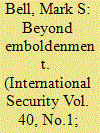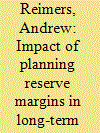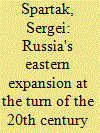|
|
|
Sort Order |
|
|
|
Items / Page
|
|
|
|
|
|
|
| Srl | Item |
| 1 |
ID:
169366


|
|
|
|
|
| Summary/Abstract |
China’s ‘One Belt One Road’ (OBOR) initiative has been billed as its most ambitious project ever in trying to shape and influence behaviour in the international system in line with her growing stature. At the same time, growing Sino-Africa relations have been the subject of scholarly debate with supporters taking an optimistic view, also presented by China itself, of this relationship being a win-win partnership. Critics led by the United States argue China is just using Africa to extract resources for its use, an allegation it refutes. The authors therefore sought to look at Sino-African relations but focussing on the implementation of OBOR in the African continent. Being the centrepiece of China’s foreign policy since 2013, a study on OBOR in Africa will give an understanding and hopefully answer some questions surrounding these relations. The lack of official bilateral agreements between China and some African countries has been examined, together with the possibility of expansion of the OBOR initiative to cover more African states.
|
|
|
|
|
|
|
|
|
|
|
|
|
|
|
|
| 2 |
ID:
140918


|
|
|
|
|
| Summary/Abstract |
What happens to the foreign policies of states when they acquire nuclear weapons? Despite its importance, this question has not been answered satisfactorily. Nuclear weapons can facilitate six conceptually distinct foreign policy behaviors: aggression, expansion, independence, bolstering, steadfastness, and compromise. This typology of foreign policy behaviors enables scholars to move beyond simple claims of “nuclear emboldenment,” and allows for more nuanced examination of the ways in which nuclear weapons affect the foreign policies of current and future nuclear states. The typology also sheds light on Great Britain's response to nuclear acquisition. Britain used nuclear weapons to engage in greater levels of steadfastness in responding to challenges, bolstering junior allies, and demonstrating independence from the United States, but it did not engage in greater levels of aggression, expansion, or compromise. The typology and the British case demonstrate the value of distinguishing among different effects of nuclear weapons acquisition, have implications for scholars' and policymakers' understanding of the role of nuclear weapons in international politics, and suggest avenues for future research.
|
|
|
|
|
|
|
|
|
|
|
|
|
|
|
|
| 3 |
ID:
073514


|
|
|
|
|
| Publication |
2006.
|
| Summary/Abstract |
The advent of a new global politics after the Cold War has led NATO to expand its geographic reach and the range of its operations. Now, NATO must extend its membership to any democratic state that can help it fulfill its new responsibilities. Only a truly global alliance can address the global challenges of the day.
|
|
|
|
|
|
|
|
|
|
|
|
|
|
|
|
| 4 |
ID:
162929


|
|
|
|
|
| Summary/Abstract |
The planning reserve margin is the predominant metric used in long-term planning models to ensure the resource adequacy of projected power systems. Considerable work has been done to estimate the contribution of variable renewable energy resources, such as wind and solar, to the planning reserve margin, but little work has been done to assess what planning reserve margin should be used in planning models. Typically, U.S.-based models use the North American Electric Reliability Corporation (NERC)-recommended reserve margin levels. However, historical reserve margins have often exceeded the NERC-recommended levels, suggesting that the use of NERC-recommended levels in planning models may negatively bias projected future capacity investments relative to real-world trends. Using the Regional Energy Deployment System capacity expansion model, we show that setting the planning reserve margin to observed levels in lieu of the NERC-recommended levels leads to substantial differences in near-term capacity additions. Scenarios using alternative specifications for the reserve margin resulted in increased national solar builds of 20–100 GW. Given that the magnitude on results from altering the reserve margin level is similar to or greater than many policies frequently analyzed with planning models, careful consideration of the reserve margin level is crucial for developing accurate power sector projections.
|
|
|
|
|
|
|
|
|
|
|
|
|
|
|
|
| 5 |
ID:
088313


|
|
|
| 6 |
ID:
169552


|
|
|
|
|
| Summary/Abstract |
This article considers various aspects of Russia's drive to the East at the end of the 19th century and the start of the 20th, including economic and political components of this process. The author explains reasons for the growing clash of interests between Russia and the United States in the Far East, down to the first systemic crisis in bilateral relations under the influence of Russian expansion in northern China and the Russo-Japanese War. The main positions of American public thought of that time with regard to Russia's Eastern policy are analyzed leading to the conclusion that the Eastern Factor helped shape the negative image of Russia in the eyes of Americans.
|
|
|
|
|
|
|
|
|
|
|
|
|
|
|
|
| 7 |
ID:
102090


|
|
|
|
|
| Publication |
2010.
|
| Summary/Abstract |
The author puts forward a vector approach to identifying Russia's geopolitical interests that helps formulate an effective strategy to advance and protect them and elevate the country's role in the world.
|
|
|
|
|
|
|
|
|
|
|
|
|
|
|
|
| 8 |
ID:
174991


|
|
|
|
|
| Summary/Abstract |
To increase acceptance and reduce opposition towards power grid expansion, various opportunities for citizen participation have been implemented within grid-expansion-related planning procedures. Previous studies have found that residents' participation can lead to an increase in acceptance and a reduction in conflict, particularly if the participation processes are perceived as fair and just. A question that has not been answered sufficiently so far, however, is why residents participate in information and participation measures offered throughout the planning process of transmission line projects. This question is addressed in the present study. On the basis of the ‘Civic Voluntarism Model’, this study derives research propositions on potential determinants of participation and empirically tests them by drawing on data collected from residents in two German regions affected by grid expansion. The results show that specific resources available to residents, psychological motivation factors, and recruiting social networks can significantly influence the probability of participation. Since the studies in both regions arrived at very similar results, the findings possess a high degree of external validity. Overall, the study presents novel insights into the mechanisms of citizen participation in power grid planning and provides policymakers, regulators, and transmission system operators with relevant practical knowledge.
|
|
|
|
|
|
|
|
|
|
|
|
|
|
|
|
|
|
|
|
|